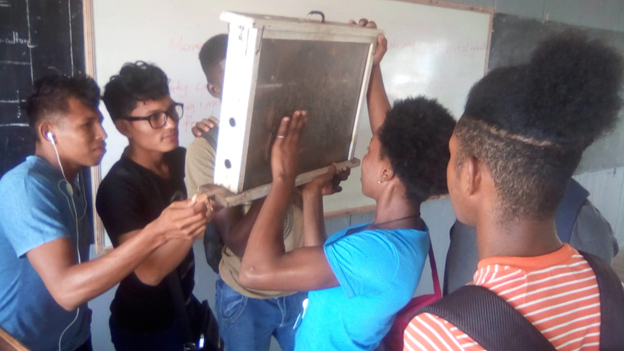With global demand for honey set to increase significantly over the next five years the local beekeeping industry is seeking to position itself to, first, increase its market share locally and beyond that to make further inroads into the regional market where domestic restrictions on imports into Trinidad and Tobago, particularly, has been creating frustrations for honey producers here.
For all the promise shown by the beekeeping industry here over the years its development remains retarded first, by the fact that it remains hard-pressed to stay abreast of the range of innovations that have developed in the process of honey harvesting which, experts say, will drive the growth prospects for the industry for at least the next four to five years. The new innovations in the process of honey harvesting are driven by the strengthening of the research and development focus in major honey-producing countries aimed at improving and increasing the quality and quantity of the final product harvested.
More than that, global leaders in the sector are deploying an increasing number of software devices to monitor the strength of hives and which allow beekeepers to track hive productivity, hive health and security.
At the Ninth Caribbean Beekeeping Congress held in Guyana from November 19-23, 2018 the focus of the deliberations centred around reshaping and repositioning the Caribbean honey industry and from a Guyana perspective increasing local interest in exploiting the economic gains to be derived from the industry.
At the opening of the Congress in Georgetown, Agriculture Minister Noel Holder made a pointed reference to the need for the local honey industry to undergo what he said was a much-needed revamp which he said could be realised “by exposing new persons to beekeeping, developing export potential in the apiculture trade in the region and boosting local beekeeping businesses by promoting apiculture products to visitors to the region”.
Earlier this week Guyana Apiculture Society (GAS) Vice Chairman and professional Beekeeper Linden Stewart told the Stabroek Business that arising out of the Congress, GAS had commenced the pursuit of a collaborative arrangement with the Guyana School of Agriculture (GSA) under which students at the institution pursuing its Certificate Course in Agriculture Science would undertake a 10-week programme in Beekeeping as a facet of a broader initiative to strengthen the industry. The course which commenced at the start of the January 2019 term is offering practical courses in a range of related areas including Hive Management, Hive Building, Honey Extraction and the Manufacture of By Products. Stewart, a former Head of GAS, and current Treasurer of the organization, Aubrey Roberts are serving as Instructors for the Course.
While the Beekeeping course is expected to broaden the knowledge base of the students pursuing an academic qualification at the GSA, Stewart said that an important objective of the initiative is to generate a level of interest amongst participants that might result in at least some of them developing a longer term interest in Beekeeping. The veteran Beekeeper said that another of the critical concerns of GAS was with the desirability of removing or at least reducing the climate of apprehension and fear that informs the general relationship between the local human and bee populations. “We believe that the more people have some knowledge of bees, the way they operate and their social and economic value the more the relationship will improve,” Stewart said.
A major challenge for the local beekeeping industry is that of filling the honey demand that exists in the local beverage industry while its efforts to penetrate the Caribbean market have been stymied by restrictive regulations.






